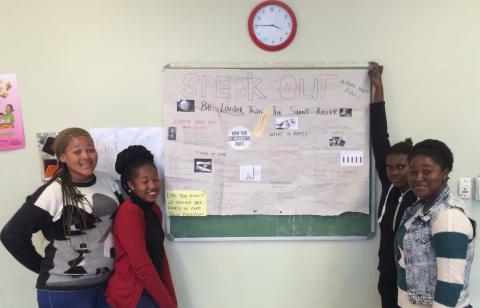

Four Grade 12 learners from Ocean View High School used the opportunity presented to them by a life orientation assignment to share with the Masinites their research on what is known as the silent emotional killer: RAPE.
They were tasked by their school to compile and share the topic with 50 people, and also give them questionnaires to answer based on the information shared with them. They felt compelled to share the information they had with the Masinites in all grades, so they could learn about rape and know that SILENCE DOES NOT MEAN CONSENT!
Nothing was as inspiring as watching them confidently delivering their presentation; Janice (the Masiphumelele English FUNdamentals Tutor) was also thrilled to witness the quality of their delivery. The learners sat quietly, digesting the information passed on to them, listening to their fellow school-mates and when the time came, asking questions; I believe that was the best part, we knew that they were engaging with the information. I can safely say that the learners left there with so much information on rape, thanks to the friendly presenters.
BIG UP MASINITES!!! With that confidence, you will go places!
Speak out!!
Alex and I have been attending the Education NGO Leadership Summit in Benoni today, hosted by the National Education Collaboration Trust (NECT).
Godwin Khosa (NECT’s CEO) explained the reasons behind NECT’s focus on interventions at the district level; he said that ultimately, we need to focus on interventions that hold potential for changing the system as a whole. Hence, they are not focusing on the level of the learner, or at that of the school. He said that while NECT could hold Saturday classes and see increased improvement in Maths and Science, these initiatives take a lot of effort, are not systemic, and have a lower sustainability potential.
And I agree with him, in that it’s clear that the system needs an overhaul, with the functionality of schools, districts and provinces increasing dramatically. However, I’m really concerned about the idea that working at the “learner level” is seen as too much effort, unsustainable, and not systemic.
We all know that the learners currently enrolled in the system are in dire need of remedial support to overcome the deficits in their grasp of the basic fundamentals, especially with regard to literacy and numeracy. 27% of our grade 6 learners are functionally illiterate (SACMEQ, 2007), grade 9s scored an average 14% in Maths in the ANAs (2014), and only 3% scored more than 50%. In 2015, the matric pass rate was 71%, but due to heavy grade dropouts, the cohort pass rate was actually just 41%.
Khosa outlined the achievements of NECT to date. While there were some references to “evidence of improvement in the organisation of schools,” the achievements were primarily limited to a list of outputs (number of principals and HODs trained, number of resource packs availed, flash cards, management trackers, etc.) rather than outcomes. Now, while Khosa is absolutely correct that expecting to see improved learner outcomes from NECT in this early stage of its operations (just two years), I am unconvinced that this approach is sufficient for ensuring that 90% of learners pass Maths, Science and Language at above 50% level by 2030 (NECT’s very important and compelling overall objective).
As I outlined in the interview with Business Day a few weeks ago, learners’ gaps in understanding and comprehension, particularly when it comes to STEM and language subjects, require individual attention and personalized learning experiences. And while ICT provides some opportunity for offering personalised and responsive learning experiences at scale, all ed-tech people will tell you, the tech is only ever going to be a small part of what it takes to improve learner achievement.
Learners need relationships, with people who give them time, who build their trust, who help them to figure out where their gaps and challenges are, and then provide them with the academic and psycho-social support they need to dramatically improve their results and confidence. In some homes (mostly in middle class homes), parents and caregivers have the education and time to do this. Most middle class families also enroll children in after-school tutoring programmes.
Unfortunately, this additional support is unavailable to the majority of our country’s learners. It is unrealistic to expect that the education system can provide this level of individualized support to learners, especially when we consider the psycho-social challenges that learners in the lowest quintiles are up against. But the view that doing so is too difficult will ensure the perpetuation of our learners’ dismal academic performance. How can we produce outcomes at the learner level, without working with learners?
Lynn van der Elst, from Miet, said that we need to better understand Government, to put ourselves in their shoes and try understand why things work the way they do. And I think that this important point speaks to the impetus behind NECT’s decision to focus at the district level and above, as levers that make sense for systemic interventions. Government’s job is to serve the 12 million learners who are supposed to be enrolled in the system. Just providing learning materials to 12 million learners must be a colossal challenge, and so it’s unsurprising that the provision of textbooks and digital learning resources is hailed as a systemic intervention, despite the lack of empirical evidence that this will lead to improved academic achievement.
Speakers also spoke about the role of NGOs as innovators, and called for increased collaboration and stronger networks of support. The National Development Plan highlights active citizenry as one of its core pillars, and most of the speakers identified the promotion and creation of active citizenry as a key role for civil society. It is these active citizens that can step up and provide the intense level of support and care that learners need, so that we can see the kinds of radical shifts in academic achievement so desperately needed.
IkamvaYouth’s volunteer tutors and mentors are evidence of what’s possible when citizens become active. Most of these volunteers are university students, and many used to be learners in the programme themselves. By consistently showing up to meet learners where they’re at, they effectively assist learners to dramatically improve their academic results, and go on to access tertiary education, learnerships or jobs. We’re working with almost 20 other tutoring and mentoring programmes, towards achieving collective impact, and together, we will be reaching 3000 learners this year.
Deputy Minister Mr Enver Surty challenged us about the tiny size of our interventions, and encouraged us to think big. “How do we take the principles and vision of the NDP into practical reality?” There were many NGOs in the room who are indeed promoting, inculcating and coordinating active citizens. NGOs like Enke, Fundza, TEACH South Africa, Room to Read, WESSA, Partners for Possibility, Equal Education, Bridge, Section 27 and Breadline Africa. NGOs who are inspiring, recruiting, equipping and coordinating active citizens to roll up their sleeves and get involved in educating learners, providing a pipeline of educators, supporting principals, improving schools, challenging policymakers, and ultimately working towards the NDP’s big goals. While many are working together already, there is always room to better leverage the potential of collaboration. And it is only through collaboration that we’ll be able to operate at the scale that makes sense to Government.
The meeting began with a screening of Thandi’s story, which so smartly illustrates the challenges that the NDP aims to address and overcome. When Trevor Manual spoke at IkamvaYouth’s ten year birthday bash, we screened Funeka’s story, to illustrate the impact that after-school tutoring and career guidance mentoring can have. A meaningful way to contribute towards the NDP’s implementation for civil society is to mobilise and activate citizens, and to coordinate our efforts, with each other, and with Government, so that together we can reach more learners like Thandi and enable them to leverage education and improve their lives, just like Funeka.
We appreciate NECT’s efforts to bring us together, and are looking forward to future engagements. Thank you for this opportunity, which we hope is just the beginning of a more cohesive and collaborative approach to realising the NDP.
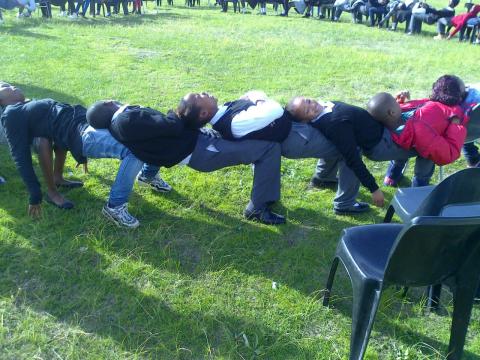
The Year Beyond programme has just had its very first successful winter school for 300 learners run by a group of 36 highly motivated volunteers. Winter school is a way of introducing our young learners to a wider world of opportunity through targeted career advice and mentoring activities, supplementary tutoring, excursions and workshops, and through career speakers offering advice and support to enable the learners to access tertiary education and employment.
Our winter schools were held at Phoenix, Manyano, ID Mkhize, and Oval North High Schools. We were hosted with warmth and the learners thoroughly enjoyed the experience. With the learners having never been to an established winter school programme, the experience unlocked their eyes and minds to a new sphere of possibilities.
Winter Schools are not like the daily routine of a normal school day, instead it’s about intensive tutoring and different workshops focussed on equipping the students with a sense of independence as well as ensuring that they leave with the confidence and understanding in mind, knowing that it starts with self. The activities and workshops were aligned with the intention of developing our learner’s leadership skills, level of awareness, valuing self and importantly raising awareness of the social issues affecting youth and the preventative actions that are available to them.

Tutoring
The core component of Year Beyond winter school is the academic content. Learners received 2 hour intensive tutoring sessions with a variety of tutoring resources including; past papers, mock exams and Answer Series study guides, English (Fundza) and Math (Olico) Fundamentals.
Workshops
In addition to the academic emphasis, the winter school provided an opportunity for a number of workshops around themes relating to general life-skills, HIV/Aids awareness, filmmaking and personal presentation skills. Learners were also exposed to information helpful to choosing subjects when they start grade 10.
The varied workshops included; Peers in Sexual Health running workshops about teenage pregnancy / STIs/ HIV information and training through experiential games and role plays; UCT Health Faculty who ran TB awareness and movie screening for health awareness; a workshop from Live Magazine on how to build a newsletter and magazine, while Rae Human and partners gave a presentation from the Film and Publication Board covering topics like cyber safety, the film industry and the Board as national regulator that were geared towards enlightening learners to the dangers of the media landscape. Students filmed their own short documentary through crash courses in sound, lighting and directing. UCT Humanities Faculty ran subject choice workshops and requirements to access post school institutions, and many learners went on an excursion to the Jewish Museum which aimed to create an understanding, gain knowledge and an appreciation of religious and cultural diversity within our society, and to respect the dignity, rights and values of people from different religions and cultures.
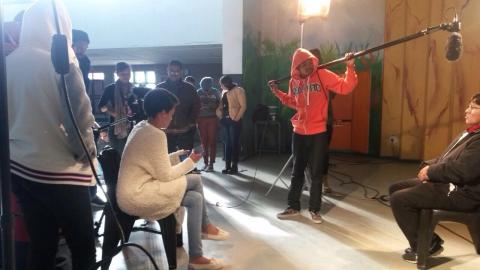
Combination of Schools
As the old adage goes; two hands are better than one and combining two schools per cluster was the winning idea. Manyano high school combined with Intlanganiso high school at Manyano and Tafelsig combined with Oval North at Oval North High. Additionally, Phoenix combined with Heideveld at Phoenix and ID Mkhize combined with Leiden high at ID Mkhize high school. At this point it’s where we could see the excitement on learners’ face when they were introduced to their peers from different schools. Peer to peer support was the tool that was used by tutors to ensure learners supported one another, but also in building a culture of hard work and being responsible to and for each other.
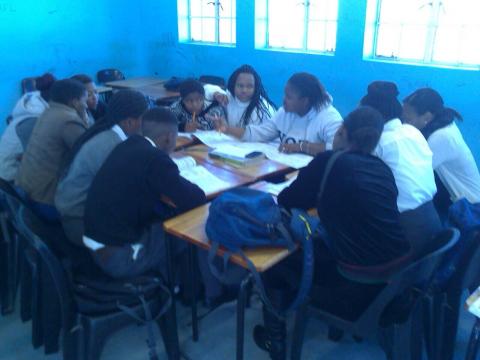
A huge thanks to all the workshop facilitators, tutors and learners – Your passion, commitment, excitement and leadership shown over this time has started to set a precedent in the schools, instilling a culture of hard work and belief in the possibility of a bright and beautiful future!
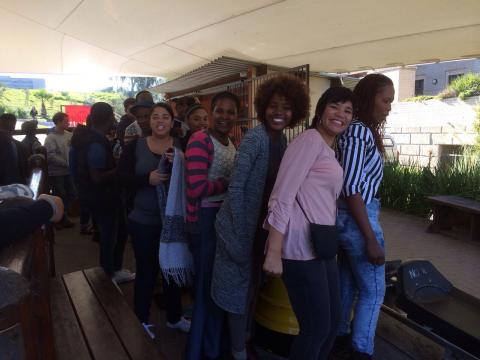
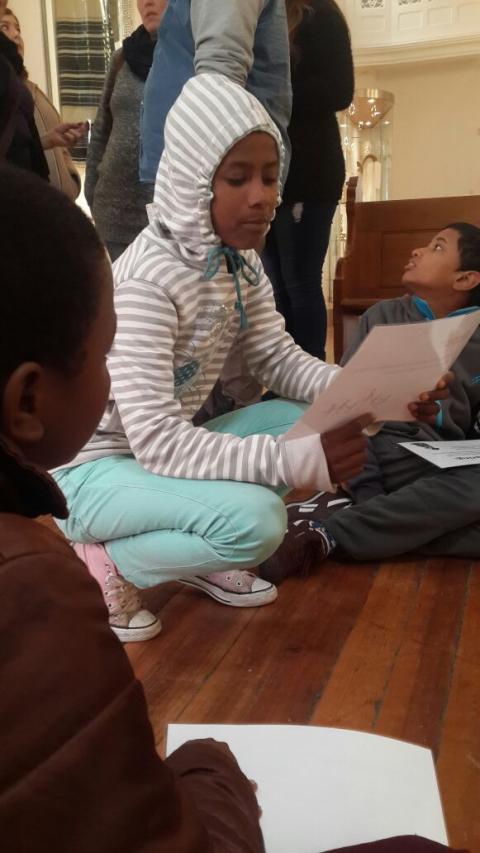
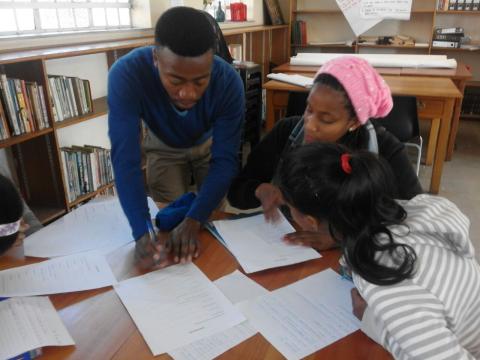
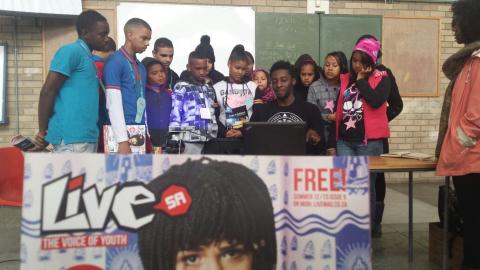
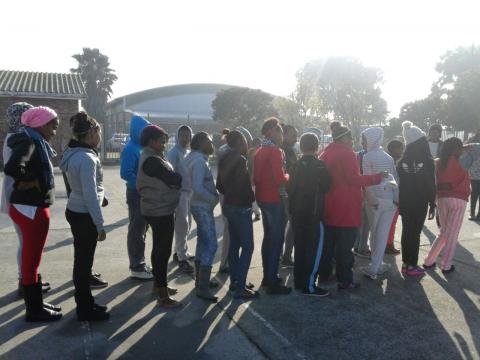
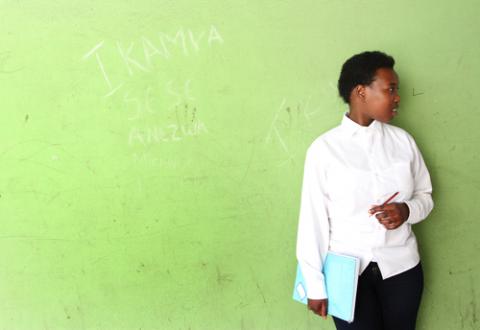
The 2013 IkamvaYouth Annual Report highlights the remarkable achievements that we have made in 2013 by enabling disadvantaged youth to pull themselves and each other out of poverty with education.You can view the full annual report here but here are some of the highlights from 2013:
- 92% of our learners passed their matric (including supplementary exams); 62% achieved a bachelor pass (compared to 30.6% nationally) and 90% of our learners accessed a post school opportunity (tertiary, learnership or employment);
- The first survey of IkamvaYouth’s alumni was conducted. The findings were more encouraging than we could have hoped: IkamvaYouth learners are almost half as likely to drop out of tertiary studies, four times more likely to graduate and are three times less likely to not be in education or employment than the average South African young person.
- IkamvaYouth WON the Stars Award which exists to reward outstanding local organisations improving the lives of children in Africa, Asia and the Middle East. IkamvaYouth WON in the category of Education in Africa and the Middle East.
Thank you for taking the future into your hands, and to holding ours. Let’s keep reaching for the stars together.

©Neo Ntsoma/Majority World
If you are having trouble with the link please click on the below link:
ikamvayouth_annual_report_2013.pdf

The Ikageng branch held a Grade 12 learners and parent meeting on the 30th August 2014 at our tutoring venue, Thembalidansi Primary School. The aim of the meeting was to discuss Grade 12 learner challenges and jointly formulate solutions to address their issues.
Our learners mentioned the a lack of clarity of the role of the parent with applications curriculum gaps created chapters not thoroughly covered at school, learner time management, low self-esteem due to personal circumstances as part of the challenges they are faced with. The parents, learners, tutors and staff discussed the challenges and some of the solutions were the following;

– Parents understand they need to part of each decision made by learners, from choosing careers to retrieving reports from schools. The branch will introduce motivational video “ice breakers” every Saturday to keep learners motivated…..WATCH THIS SPACE..!!!
We held an Interview with one of our Ikamvanite parents: M.s S.M Makale , parent of Lerato Makale- 2014 IY Matriculant, to understand her views of the Grade 12 learners and parents meeting.

Q: How does it feel knowing that you child is part of the first group of Ikageng matrics?
A: I am happy that my daughter is part of Ikamva Youth, there is an improvement in her school ethic and I will give her more support.
Q : Todays meeting, your thoughts..?
A : Well..as tutors, you guys are doing a great job and your presence is a motivation to our children to excel in schoolwork. As parents, we should take initiative and interest in our children’s studies, by supporting them in whichever way we can.
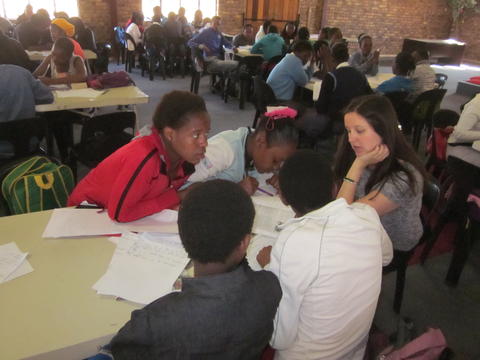
Five years ago, I found IkamvaYouth by chance and had the opportunity to work with amazing people at the Western Cape’s Winter School. This year, I came back to Ikamva on purpose. I am PhD student from the US, researching democracy and citizenship education in South Africa. I knew I had to do so some preliminary research in SA, so I made sure to schedule my visit during the Winter School. This time, I came to Gauteng, but once again I was welcomed warmly and put straight to work, developing lessons, tutoring and recruiting learners for an afternoon stream, the Peacebuilders’ Club.
Before I arrived, I prepared several English fundamentals lessons and was nervous that they would be too easy, too hard or just too American. With the help of the Ikamva staff and feedback from tutors, I was able to adjust and witness some moments of real learning. No matter where you are, introducing a little controversy and debate can help to engage learners. Between family relations, the death penalty and President Obama’s meeting with President Zuma, there was plenty to talk about. Tutoring at this year’s Gauteng Winter School was a rewarding and eye opening experience. From Romeo & Juliet and human anatomy to the French Revolution and layers of the atmosphere, I was constantly trying to keep up with the brilliant learners of Ebony and Ivory Park. More than once I had to double check my facts and ask more in-depth questions to challenge the motivated learners. I had to avoid the maths’ lessons altogether because they were over my head!

I was also able to help a fantastic group of learners form a Peacebuilders’ Club. I have worked with the US Institute of Peace for several years and they have developed a great serious of activities and lessons on peacebuilding and conflict resolution for secondary school students. All I had to do was bring these activities along and the learners quickly took over and became real peacebuilders and leaders. They did skits, created art and made goals for the future of the club. I want to say a huge thank you to the Peacebuilders’ Club for being so open-minded and motivated! On my last day with Ikamva, the whole group went to Freedom Park in Pretoria. This was an incredible experience for me, both as a visitor, and as a student of history and citizenship. It was moving to see the memorial to those who gave their lives in the struggle for freedom, and it was equally moving to see the tutors and learners participate in a dialog about the struggle and what it means to them.
This demonstration of active citizenship shows how IkamvaYouth not only helps learners to achieve in school, but also to participate in their communities and nation. I have been back in the US a week now, and I can only say a big thank you to the Gauteng staff, tutors and learners for an amazing time at the 2013 Winter School!




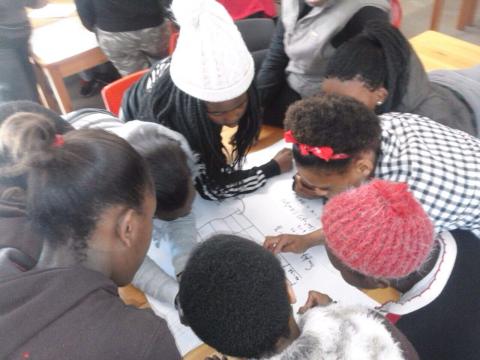









 Lloyd Lungu
Lloyd Lungu